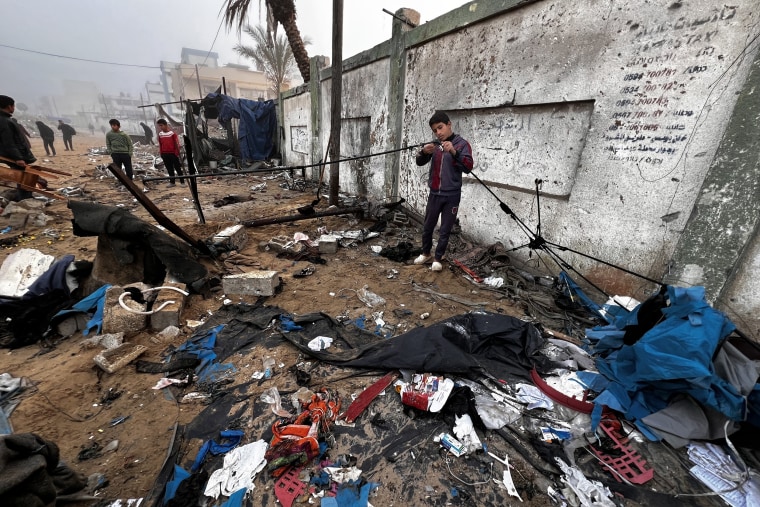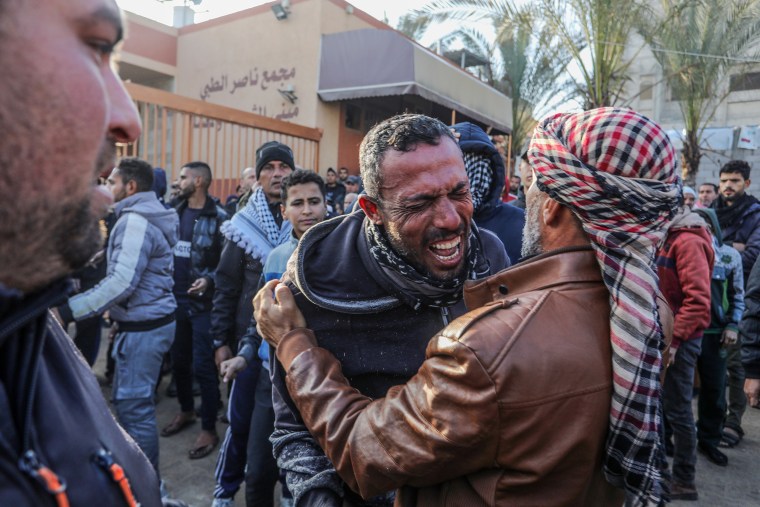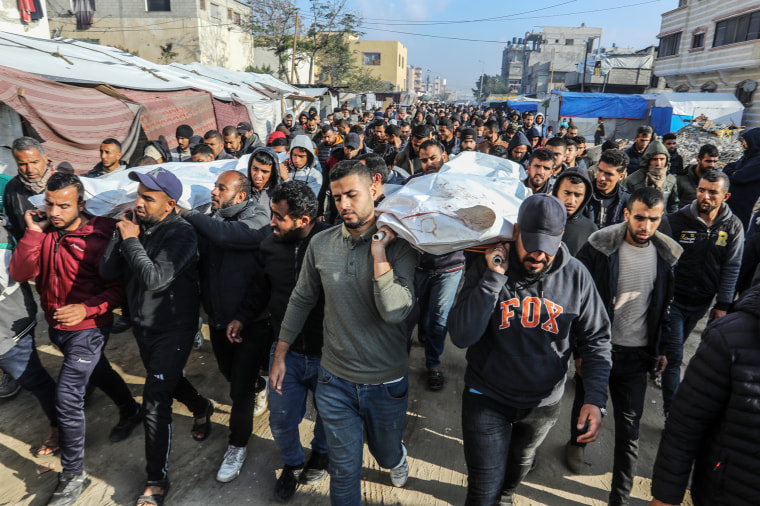The Israel-Hamas ceasefire deal will go into effect too late for Akram Abu Ahmed to see his children again.
His family’s sole survivor after an Israeli airstrike, Ahmed was sleeping in bed near Gaza City in the early hours of Thursday after celebrating news of the truce when he heard a loud sound and was thrown into the air.
“Dust and screams surrounded me,” he said, adding that his wife and three of his children were killed, including a daughter whom he said was a doctor.
“Is this what they aim for? Killing doctors?” he said. “This is the question I want you to answer, Netanyahu: Why did you kill my daughter?”
In less than two days since the ceasefire deal between Israel and Hamas was announced Wednesday, fighting in Gaza and a series of deadly airstrikes have killed at least 115 people, Mahmoud Basal, spokesperson for Gaza’s Civil Defense agency told NBC News on Friday.

Among those killed, he said, were at least 28 children and 31 women, with at least 265 people injured. More deaths were reported across the enclave.
“Since the ceasefire was announced, the people of the Strip have been living difficult and sad nights, instead of being happy with the news they have been waiting for for a year and a half, as the Israeli occupation has intensified its raids on all parts of the Strip,” Basal told NBC News on Friday.
In a statement Friday, the United Nations’ Human Rights Council condemned the strikes, saying “we are dismayed that shortly after the deal was announced, Israel continued bombing Gaza indiscriminately, killing Palestinian civilians despite expectations of calm until the ceasefire takes effect.”
The council urged all parties to accept the Gaza ceasefire deal to end “15 months of immense and terrible suffering in Gaza.”
The Israel Defense Forces said Thursday that it had carried out strikes on “approximately” 50 targets across the Gaza Strip “over the last day.”
It said some of the targets included “Hamas and Islamic Jihad terrorists, military compounds, weapons storage facilities, launch posts, weapons manufacturing sites, and observation posts.”
The military also said it killed Muhammad Hasham Zahedi Abu Al-Rus in a strike, who it said had participated in the deadly assault at the Nova music festival as part of the Hamas-led Oct. 7 terrorist attacks, in which some 1,200 people were killed and around 250 taken hostage.

Israel launched its 15-month offensive in Gaza in the wake of that attack, and more than 46,500 people, including thousands of children, have since been killed in Gaza, according to local health officials.
The IDF has maintained that it does not target civilians and that, prior to the strikes this week, “numerous steps were taken to mitigate the risk of harming civilians and civilian infrastructure,” including the use of aerial surveillance, precise munitions and additional intelligence.
Researchers have suggested the death toll in Gaza could be significantly higher than the official numbers. In a peer-reviewed study published earlier this month in The Lancet journal, researchers at the London School of Hygiene and Tropical Medicine estimated that as many as 64,260 people were killed in “traumatic injury deaths” from Oct. 7, 2023, to June 30, 2024 alone.

The Israeli government was holding a vote Friday on whether to approve the deal, and if approved, the Supreme Court will then have 24 hours to permit any appeals, with the possibility of a ceasefire taking effect as early as Sunday.
But until then, the airstrikes may well continue.
On Thursday, four young children, who witnesses say were killed in the string of airstrikes launched by the IAF, lay bloodied and lifeless on the ground outside a hospital in Gaza City.
In video later captured by an NBC News crew on the ground, their small bodies were shrouded alongside the corpses of other victims at Al-Ahli Baptist Hospital.
“They were sleeping happily with the news of the truce,” one man told the crew. Then, he said, “the Israeli airplanes shelled us.”